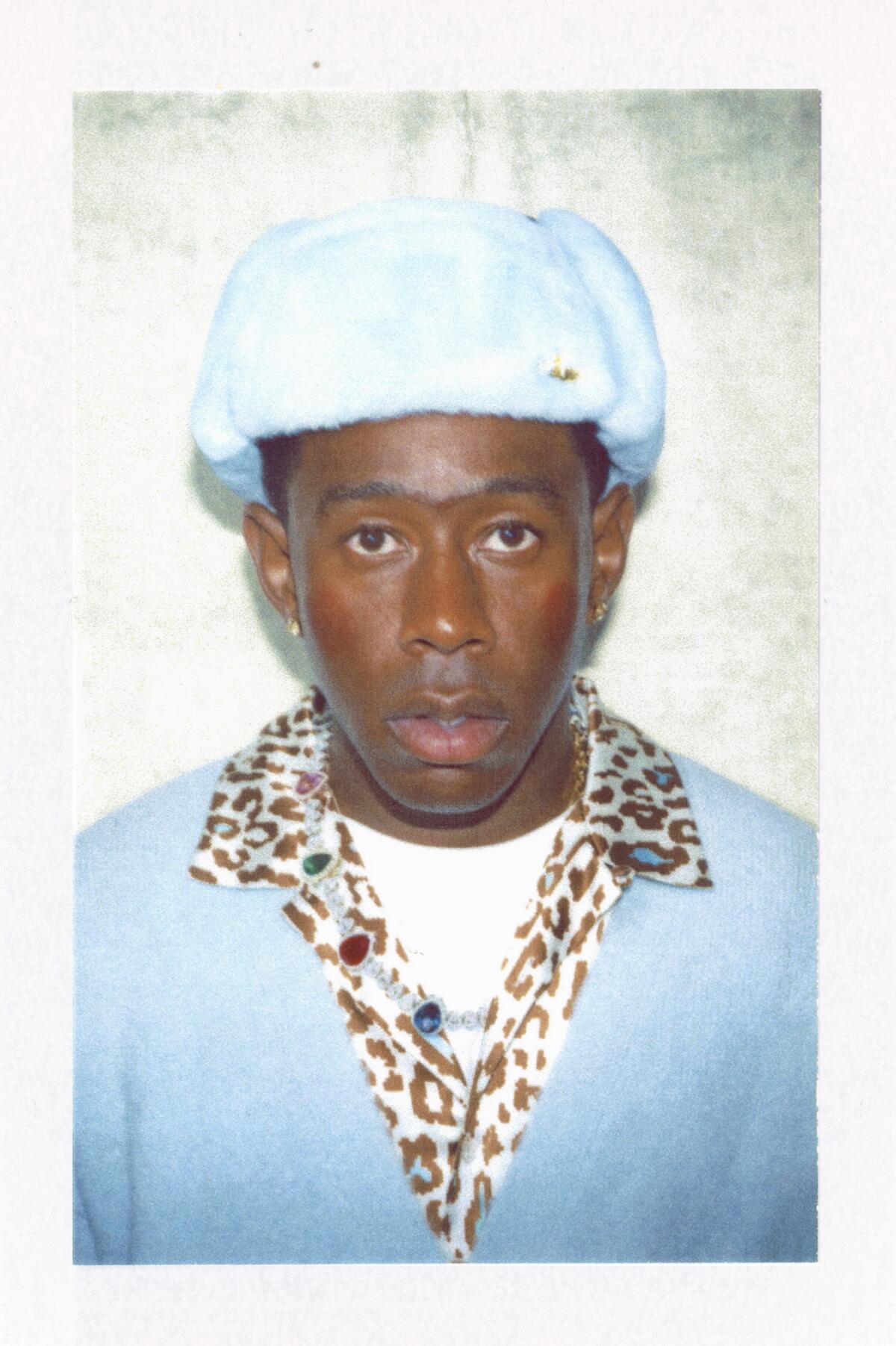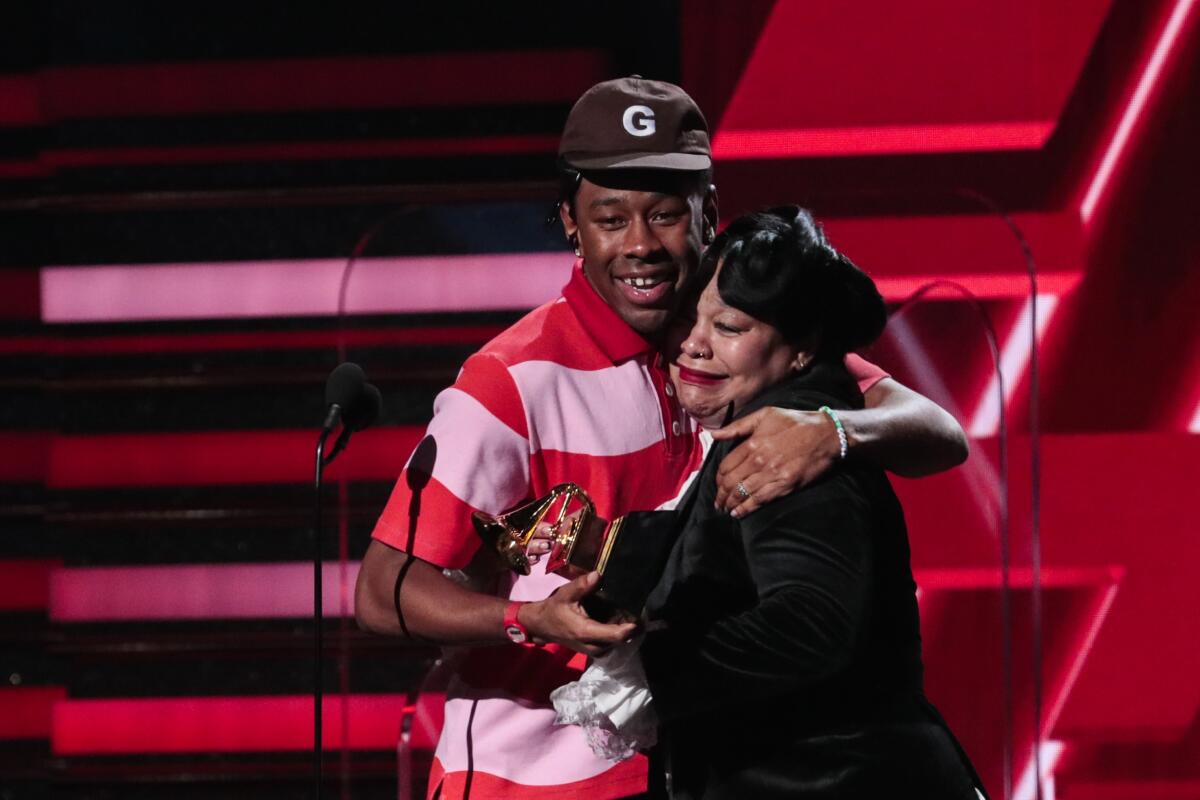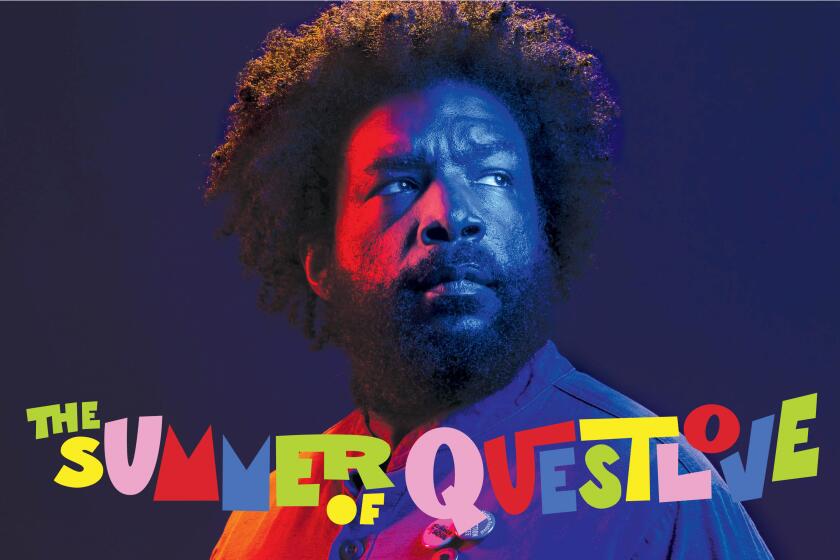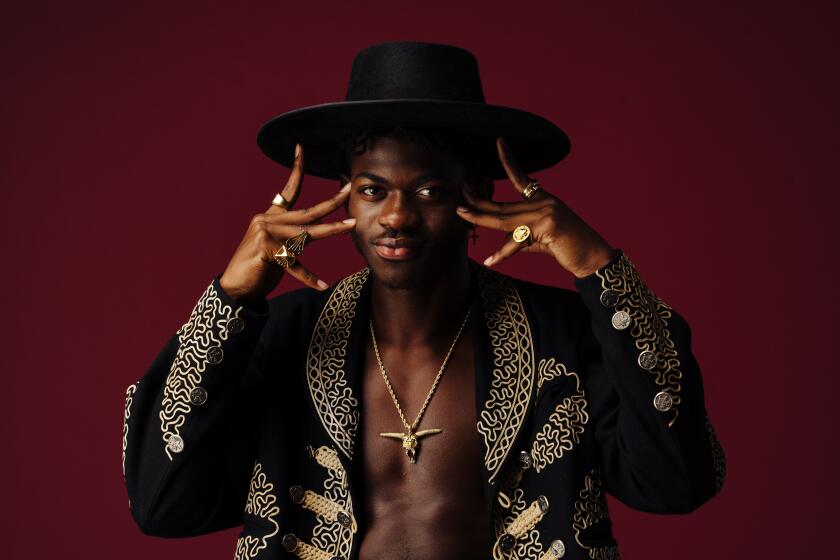Review: Tyler, the role model? On sincere and ambitious new album, Tyler, the Creator comes into his own

A little past the halfway mark of Tyler, the Creator’s gripping new album, “Call Me If You Get Lost,” the Los Angeles rapper’s mom puts in a cameo that threatens to steal the show from her son and his other, far more famous guests.
Titled “Momma Talk,” the appearance takes the shape of a minute-long monologue in which Tyler’s mother, Bonita Smith, recounts the lengths she went to to protect Tyler (whose last name is Okonma) when he was a kid growing up in Hawthorne: “I’d kill a motherf— over this one right here,” she says, pride coursing through her words. “My son used to record me beating bitches’ ass.” She runs down a partial list of the people she “bossed up” on — “teachers, principals, mamas, kids” — then interrupts herself.
“Am I lying?” she asks, to which Tyler responds in his low, gravelly voice: “You have no reason to.”
It’s a striking endorsement of the cold, hard truth from an artist who made his name with willfully provocative hyperbole.

Now a well-connected member of a Black creative vanguard that also includes the likes of Solange, Donald Glover and Issa Rae, Tyler emerged more than a decade ago as the scowling face of L.A.’s punk-inspired Odd Future collective — a teenage Eminem stan whose raw, rowdy music showcased a rogues’ gallery of unreliable narrators boasting about rape and murder.
On early records like 2011’s “Goblin” and “Wolf,” from 2013, you knew not to take Tyler’s words literally, even if you understood that they carried real pain.
Roots drummer and music historian Questlove counters Black erasure with his directorial debut, the Civil-Rights-era concert film ‘Summer of Soul.’
In contrast, here he is at age 30 on “Call Me If You Get Lost” telling sincere, relatively plainspoken stories about the alienating effects of celebrity and about the pressure to form coherent political thoughts and, most vividly, about a furtive romantic relationship with the lover of a close friend.
What’s more, after years of feinting, he’s finally taking a clear moral stance: “I’m a bad person — like, I’m in the wrong,” he admits in “Wilshire,” the album’s stirring emotional centerpiece, in which he spends eight minutes sifting through the facts and the self-delusions of that complicated affair.
Yet “Call Me If You Get Lost” — Tyler’s seventh LP and the follow-up to 2019’s Grammy-winning “Igor” — isn’t the somber, stripped-back confessional you might expect; it’s not a millennial’s version of Jay-Z’s “4:44,” where hip-hop’s alpha braggart radically toned down his sound to ruminate on his reasons for cheating on his wife, Beyoncé.

Hosted, as Tyler puts it, by the ever-spirited DJ Drama, “Call Me If You Get Lost” instead aspires to one of rap’s most grandly theatrical traditions: the quasi-legal gray-market mixtape — specifically Drama’s beloved “Gangsta Grillz” series, which in the mid-2000s yielded boisterous, freewheeling documents by Lil Wayne, Jeezy, Pharrell and others.
Drama threads his signature exhortations throughout the album, alternately hyping Tyler up (“On this here stage tonight is something legendary,” he bellows to open “Corso”) and providing comic-absurdist detail (“A young lady just fed me French vanilla ice cream,” he notes in “Hot Wind Blows,” about Tyler’s world travels).
And though Tyler produced all the songs himself — a rarity among rappers — the music covers a huge amount of ground, moving from the creamy R&B of “Wusyaname” to the trippy soul-jazz of “Hot Wind Blows” to the grimy boom-bap of “Lumberjack,” which in classic mixtape form more or less cribs the beat from an existing track, in this case the Gravediggaz’s mid-’90s “2 Cups of Blood.”
Splashy cameos from Pharrell, Lil Wayne and Lil Uzi Vert further broaden the disc’s stylistic scope even as Tyler invites the listener deep into the private space of a song like “Manifesto,” in which he ponders his old antics (including a bunch of creepy tweets he sent to Selena Gomez) and frets over whether he’s “doing enough or not doing enough” to advance the cause of racial justice. In its blend of the spectacular and the hyper-personal, the result can recall “My Beautiful Dark Twisted Fantasy” by one of Tyler’s heroes, Kanye West.
“Call Me If You Get Lost,” which is forecast to top next week’s album chart, also reframes Tyler’s relationship with the hip-hop mainstream. For years he saw himself as an outsider — “I never fully felt accepted in rap,” he said in his speech at the Grammys — and so he and the rest of Odd Future built a kind of parallel universe complete with clothing lines, TV shows and L.A.’s annual Camp Flog Gnaw music festival.
That universe attracted fellow misfits: In 2019, when Drake made a surprise appearance at Flog Gnaw in a slot many thought was meant for Odd Future’s Frank Ocean, the crowd infamously booed the pop superstar.
Yet social media and digital streaming, where Tyler flourishes, have shifted power away from the record labels and radio stations that once controlled hip-hop; now Tyler enjoys the type of industry prestige and commercial clout that earlier charismatic weirdos could only dream of, which might be why he seems so at home amid DJ Drama’s big-tent trappings. (Looking back, Tyler’s flirty 2019 interview with Funkmaster Flex — that stalwart guardian of centrist hip-hop values — seems like a crucial step in this album’s development.)
Lil Nas X has dropped a Marvel-inspired trailer for his debut album and clapped back at homophobic haters who dissed his BET performance.
Indeed, he’s become sufficiently established that on “Call Me If You Get Lost” he’s the one arranging guest spots from quirky younger acts with devoted online followings: Teezo Touchdown, who adds emo-rap squeaks to “Runitup”; 42 Dugg, charmingly growly in “Lemonhead”; YoungBoy Never Broke Again, who yelps a wistful verse in “Wusyaname.”
In a way that’s a very Drake move — pulling close potential threats. But with Tyler the curating feels less opportunistic; he seems to take real pleasure in serving as a bridge figure between two generations. There’s a great series of backstage photos of Tyler and Lil Nas X at Sunday’s BET Awards, and what comes across is Tyler’s genuine admiration for the artists remaking hip-hop in his footsteps.
With the psychedelic “Igor,” Tyler’s innovation had to do with his formal slipperiness — here was a rap record, according to the Grammys, with basically no rapping on it — and with lyrics widely perceived to be about queer romance.
And he’s still tweaking the genre’s conventions in those ways — in a song like the nearly 10-minute-long “Sweet/I Thought You Wanted to Dance,” which mashes together sparkly R&B and throbbing reggae, and in “Massa,” where he says, “Everyone I ever loved had to be loved in the shadows.”
Yet the evolution on display on “Call Me If You Get Lost” is more elemental; he’s rethinking what kinds of stories he wants to use his music to tell and how much of himself his success obliges him to reveal.
“This is my perspective / This is how I feel,” he insists toward the end of the epic yet painstaking “Wilshire,” “I ain’t fabricate nothing / I kept it real.”
He sounds as surprised as anyone else.
More to Read
The biggest entertainment stories
Get our big stories about Hollywood, film, television, music, arts, culture and more right in your inbox as soon as they publish.
You may occasionally receive promotional content from the Los Angeles Times.













